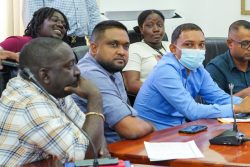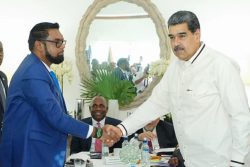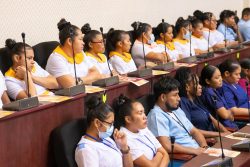Despite a poor turnout, a consultation on the draft witness protection and whistleblower bills went ahead yesterday and while there was support for the proposed laws, concerns, including the absence of political accountability and the persistence of a culture of silent dissent, were raised.
There were just over three dozen persons in the Savannah Suite of the Pegasus Hotel yesterday, with almost half being media workers and employees of the Ministry of Legal Affairs/Attorney General’s Chambers who were present for the public consultation on the Witness Protection Bill 2016 and Protected Disclosures (Whistleblower) Bill 2016.
The venue was prepared with seating arrangements for about 150 persons but very few people attended, although in the past there have been complaints about the lack of consultations on draft bills.
The session lasted for just over two hours, an hour of which was spent responding to questions raised by the small audience. No indication was given that another session will be held before the bill is sent to the National Assembly.
Among those who presented their views on the bills was Mike McCormack of the Guyana Human Rights Association.
He pointed out that each bill focuses on mechanisms which are about to be introduced but there is no “political framework” by which to assess their usefulness. He likened the situation to being asked to assess the usefulness of an engine without the knowledge of what it is intended to be used for.
He spoke of the previous process which involved the circulation of a consultation paper by government, outlining the proposal that would be advanced. He said these “green papers” welcomed widespread comments. Based on the responses, he said, a “white paper”—a Cabinet document that refined the ideas—was produced. He said that even at this stage there were more consultations before it was taken to the National Assembly for approval. “What we are doing… is the opposite way around. We are starting with what is going to Parliament for approval, without knowing what is the framework this is intended to achieve,” he said, while adding that the human rights body’s observation surrounds the implications not using the former process will have.
He pointed out that another issue is morality. “The national political framework in which we operate and [in] which new Guyanese legislation is being produced is one that has been shaped by an illegal Constitution… an electoral system devoid of accountability to electors, which has contributed to a widespread culture of public conformity and private dissent,” he said. He stressed that there is no “vigorous public opinion calling anybody to account and in that framework we are introducing the commission to encourage people to come and anonymously whisper to [a] commissioner things they know about other people.”
McCormack stressed that the Whistleblower Bill does not address the major need to revitalise the “notion of citizenship and rehabilitate the concept of citizenship in a way that privileges the notion that state assets are property of the nation and that it is everybody’s interest to protect that.” He noted that the draft bill envisages a rather “unusual” degree of courage as it relates to communicating with the commission.
It was later explained that the commission for the Whistleblower Bill will be made up of representatives from the Guyana Bar Association and the Integrity Commission, and the chairperson is supposed to be a judge or someone who is qualified to hold the office of a judge.
McCormack opined that what is needed is the ability to express opinions freely, demanding the provision of truthful information and holding people to account.
He stressed that the required transformation in the way we conduct public life cannot be secured simply by people anonymously reporting improper conduct to the proposed commission.
Another issue he raised is that the draft legislation introduced a multiplicity of mechanisms but “we do not have the capacity to properly people; for example, we have five or six commissions known as rights commission …when what we need is one human rights commission with a series of sub-commissions.”
He also spoke of the continued resistance to gender neutral language in bills and asked that this be considered as it is now offensive beyond what can be justified.
‘Morally, not just legally’
Chief Parliamentary Counsel Cecil Dhurjon, in response, said that the issues outlined have been carefully noted. Making reference to the concerns raised, he said they will be addressed. “We can assure you that we [will] bear this in mind and try and enrich our legislation. It is not late at this stage to take on board some of your suggestions,” he said, while adding that the concerns raised were encouraging, enlightening and appreciative.
Williams, in his opening remarks, told the gathering that the policy of the government is to have consultations on all bills before they are taken to Parlia-ment. “We ensure we come to you and get your views,” he said.
Williams, responding to some of the points made by McCormack, noted that it must be understood that government cannot legislate a culture and that perhaps the laws that are implemented may contribute to a new way of behaving. He said government cannot fold its arms and “wait for a change in culture” and has the responsibility to follow through on international treaties signed on to in the form of legislation.
Deputy Vice-Chancellor of the University of Guyana Barbara Reynolds called for a public education campaign to not only educate people about the legislation but also to integrate them into their everyday lives.
She expressed hope too that complementary legislation and mechanisms would be put in place. She said that among her concerns is that in the explanatory notes for the Whistle-blower Bill reference was made to a Caricom and a regional instrument. “I think it is important that we seek some countenance with our own Constitu-tion,” she said
She also raised concern about the rule of law being seen as the only prerequisite for either bill to have any success. Reynolds opined that a second
prerequisite would be peace and security. She later said that there is a need for greater respect and adherence to continental human rights. “So the rights framework in Guyana needs to be buttressed,” she added.
Reynolds too spoke of the country’s culture and how the legislation may resonate with it, while noting that the society is one where “snitching” is not encouraged. “…We suffer in silence and so reversing that culture to ensure that first of all there is an acceptance that this is the right thing to do, morally, and not just legally …would mean that we would have to have some shift, some change in our culture,” she said, while noting that students would pass anonymous notes to her out of fear of retribution.
Failure to enforce the law
Minister of Foreign Affairs Carl Greenidge, who said he was speaking from a layman’s perspective, made mention of High Commissioner of Canada to Guyana and Suriname Pierre Giroux’s call for the establishment of a code of conduct as a device to ensure charges instituted against those in the public sector who have committed breaches. He suggested that such a code of conduct would deal with behaviour outside those that are clearly criminally identified. He said that attention needs to be paid to what has been drafted in ensure that it catches the most nebulous issues.
Greenidge, speaking about the moral context in which the legislation is being drafted, said that one has to pay attention to the points made by McCormack. He made it clear that he would endorse his positions on public conformity and private dissent. “That is a fact. I would think that the way that we have to try and deal with that is not to legislate for it… it is the failure to enforce the law that has caused the public to be hindered in that way,” he said.
He said what he would draw from his remarks is that perhaps the process for consultation and decision-making needs to be more open and perhaps a lot more extensive. He suggested that institutional arrangement to be put in place to allow for a more realistic dialogue rather than an unwillingness to say things that can’t be said publicly. “Obviously, you can’t legislate for it but you can have an institutional arrangement… that permits critical decisions, decisions critical of ministers or critical for the political directorate,” he said.
Businessman Roshan Khan welcomed both bills and spent some time highlighting his concerns with the Witness Protection Bill. He questioned whether those persons who would be placed in the programme will undergo any polygraph testing before and during and what efforts will be put in place to ensure that sensitive information/documents stored on computers would be kept safe and out of the reach of hackers.
A suggestion was also made by attorney Llewellyn John to have the proposed legislation broadened to include protection for those who have to testify in Commissions of Inquiry.
Apart from Williams, Giroux and Dhurjon, panelists at the consultation were Registrar of Commerce (ag) Nicole Prince, Legislative Drafting Consultant Ananda Dhurjon, and Parliamentary Counsel Ronetta Sargent.
The panel also answered questions pertaining to a person in the witness protection programme wanting to get married and whether a person in the programme would be permitted to travel using their visa.
Copies of the draft Bills can be accessed at http://www.legalaffairs.gov.gy/images/pdf/TWP.pdf and http://www.legalaffairs.gov.gy/images/pdf/PROTECTEDDISCLOSURBILL2016.pdf








